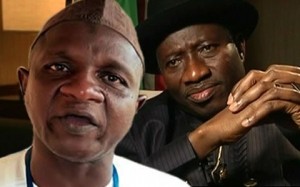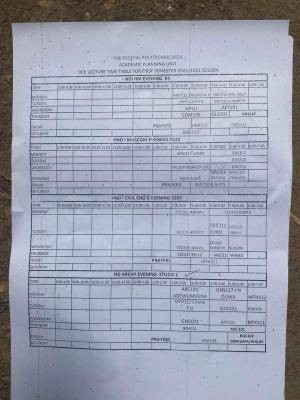
Striking lecturers in the nation’s public universities on Monday made good their decision not to return to work as directed by the Federal Government.
The striking teachers also refused to sign the attendance registers in their respective institutions as ordered by the government.
They said they were only waiting for the sack letters the Federal Government threatened to give them if they did not return to work.
In many of the universities visited by our correspondents, only administrative offices opened for business while the lecture rooms were empty. Particularly, lecturers’ offices remained shut.
Among some of the universities visited by our correspondents were the University of Lagos, University of Ibadan, Ahmadu Bello University, Zaria, University of Calabar, Nnamdi Azikwe University, Awka, and the University of Uyo.
Others are Obafemi Awolwo University, Ile-Ife, Federal University of Agriculture, Abeokuta and the Olabisi Onabanjo University, Ago-Iwoye.
The Supervising Minister of Education, Nyesom Wike, had urged the striking lecturers to return to work or on before December 9 or risk being sacked.
But the leadership of ASUU had remained unfazed by the FG’s directive and threat. They accused the government of insincerity in the resolution of the face-off.
At the NAU, Awka on Monday, though some of the lecturers were on campus, they did not teach. The institution’s Faculty of Social Sciences, for instance, had its classrooms and laboratories shut.
The hostels were opened but students had yet to return to the campus.
At UI, only a few lecturers were on the campus. They neither taught nor signed the attendance register.
The institution’s chapter of ASUU earlier in the day had sent a message to its members, urging them to be calm and resolute in their demands.
The National Treasurer of ASUU, Dr. Ademola Aremu, said they would have wasted their time and effort if they caved in and returned to work under threat.
He said, “How can you call off a strike when there is nothing to show for it? The government is not qualified to call off the strike. Our union is awaiting the government to state all it has done in black and white. However, it is a serious insult on us for the government to be harassing us with sacking threat. We are not casual workers or labourers. Our research work has been ongoing.”
Also, at UNICAL and at the Cross River University of Science and Technology, students and their teachers stayed away from the schools.
The UNICAL ASUU Chairman, Dr. James Okpiliya, insisted that the Federal Government must meet the lecturers’ demands before the strike could be suspended.
Lecturers also shunned work at OAU even though a few of the students were on the campus.
One of our correspondents observed that many of the students who returned to campus were those residing within Ife and its environs.
The Chairman of ASUU at the university, Prof. Adegbola Akinola, who spoke to one of our correspondents, said that the strike was still on.
He said, “Our union did not close the universities, what we did was to withdraw teaching services and they will remain withdrawn until the government properly documents the agreement reached with us on November 4, 2013.”
Lectures did not also hold at ABU. The two campuses of the institution at Samaru and Kongo had only a negligible human presence as of Monday.
Lecturers’ offices and lecture halls were shut, just as the students did not show up as directed by the government.
ASUU Chairman, Dr. Mohammed Kabir-Aliyu, told journalists that they had yet to call off the action.
The UNIJOS ASUU chapter Chairman, Dr. David Jangkam, said striking teachers in the university were just waiting for their sack letters from the Federal Government.
Jangkam said, “We are waiting for their sack letters. Any government that is toying with education is not worth its salt. We expect firm commitment in solving the issues, but if the government is playing to the gallery, it is very unfortunate.”
When our correspondent visited the various departments, only a few departments had opened registers as demanded by the governing council.
There were no studies too at UNIUYO, UNIJOS, FUNAAB, LASU and UNILAG as lecturers boycotted classes.
Meanwhile, President Goodluck Jonathan, on Monday, urged the striking teachers to call off the industrial action.
The President, who spoke at the All Nigerian Judges Conference organised by the National Judicial Council in Abuja, on Monday, said the industrial action would prevent the country from achieving the Vision 2020 target of becoming one of the top 20 economies in the world by 2020.
Although the Federal Government had recently threatened to sack the lecturers for going on strike, Jonathan noted that ASUU had the right to embark on the industrial action.
He said, “This administration recognises and respects the right of workers, including the right to embark on industrial action to press home their demand and have taken concrete steps to address the grievances of ASUU.
“I therefore use this occasion to call on ASUU to call off its strike.”
“With this Nigeria’s quest to become one of the world’s 20th largest economies by the year 2020 cannot be achieved in an atmosphere of industrial disharmony.
“Nigeria’s geopolitical history has been characterised by incessant labour dispute and industrial action.
“While views may differ on the utility of industrial action as a means of advancing the collective interest of workers in the polity, it is an unassailable fact that labour and industrial harmony is sine qua non to the socio-economic development of any nation, Nigeria inclusive.”



